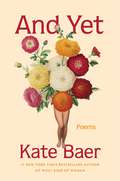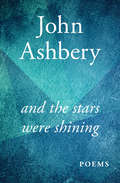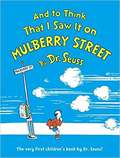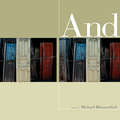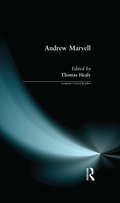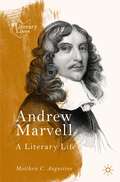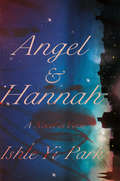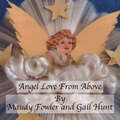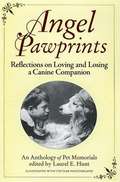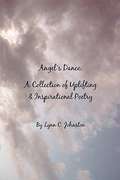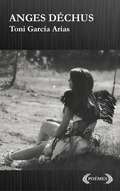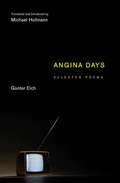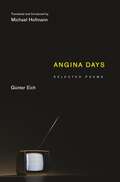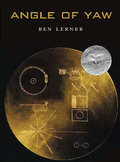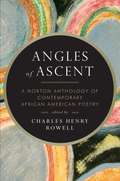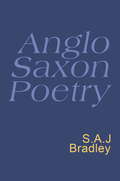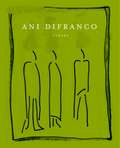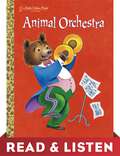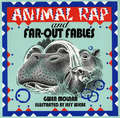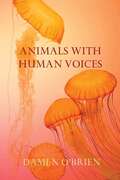- Table View
- List View
And Yet: Poems
by Kate BaerI will love and be loved. Save and be saveda thousand times. I will let the want intomy body, bless the heat under my skin.My life, I will not waste it. I will enjoy this life.From Kate Baer, the #1 New York Times bestselling author of What Kind of Woman, comes her much anticipated second full-length traditional poetry collection, And Yet.And Yet dives even deeper into the themes that are the hallmarks of Kate's writing: motherhood, friendship, love, and loss. Taken together, these poems demonstrate the remarkable evolution of a writer and an artist working at the height of her craft, pushing herself and her poetry in a beautiful and impressive way.In this collection, Kate offers much needed inspiration to find the joy, and the hope, in all of life's mess and miracles.
And the Stars Were Shining: Poems (G - Reference, Information And Interdisciplinary Subjects Ser.)
by John AshberyWitty yet heartbreaking, conversational yet richly lyrical, John Ashbery&’s sixteenth poetry collection showcases a mastery uniquely his ownAnd the Stars Were Shining originally appeared in 1994, toward the midpoint of a startlingly creative period in Ashbery&’s long career, during which the great American poet published no fewer than nine books in ten years. The collection brings together more than fifty compact, jewellike, intensely felt poems, including the well-known &“Like a Sentence&” (&“How little we know, / and when we know it!&”) and the lyrical, deeply moving thirteen-part title poem recognized as one of the author&’s greatest. This collection is Ashbery at his most accessible, graceful, and elegiac.
And to Think That I Saw It on Mulberry Street
by Dr SeussA boy imagines a series of incredible sights on his way home from school so that he will have an interesting report to give his father. All images are described.
And: Life And Loathing In Greater Israel (American Poets Continuum)
by Michael BlumenthalThrough Michael Blumenthal&’s eyes we gain a renewed, childlike wonder at everything from plants, trees, and relationships to the most fundamental word in our vocabulary: AND. Blumenthal uses the conjunction to unify this collection and create a chanting, sonorous rhythm to his work. The result is a book of poems-as-hymns-and-praises.Michael Blumenthal holds the Mina Hohenberg Darden Endowed Chair in Creative Writing at Old Dominion University. His other books include the memoir All My Mothers and Fathers (HarperCollins Publishers, 2002), and the poetry collection Dusty Angel (BOA Editions, Ltd., 1999), for which he was awarded the Isabella Gardner Poetry Award. Blumenthal&’s new collection of poems, titled &“And,&” is the closest that the stoicism of Ecclesiastes will come to getting a 21st-century makeover. In it, there&’s a time to laugh and cry, scatter stones and gather them up, and all the rest. There&’s no point, though, in toil and hope beyond that. After reading these poems, which are designed with a cosmic sweep, you get the feeling that Blumenthal&’s plan is, as in Dylan Thomas&’s poem, eventually just to go gentle into that good night: &“Rage, rage against the dying of the light&” be damned.--THE JEWISH DAILY FORWARDMichael Blumenthal&’s stunning new book, And, is an Eliotic celebration of life in the world as continuum and progress. He achieves this through a simple and seductive meditation upon the conjunction, &“and,&” and the way it enriches the complexity of language as it shapes lived experience.--The Montserrat Review
Andal's Nachiyar Thirumozhi
by AndalAndal was a 10th century Tamil poet who is revered as a saint in the southern parts of India. Infact, she is considered as one of the twelve Alvars (saints) and the only woman Alvar (saint) of Vaishnavism (a cult devoted to Lord Vishnu). After her first work known as Thiruppavai, this one, Nachiyar Thirumozhi is the second compilation by Andal consisting of 143 verses. Through this poem, she disclosed her passionate yearning for Lord Vishnu. These 143 verses are a part of the 4000 hyms of Nalayira Divya Prabandham and are organized in 14 segments, each one called a tirumozhi. The poems compiled by Andal in her teenage years, display a high level of literary and religious maturity.
Andrew Marvell (Longman Critical Readers)
by Thomas HealyAndrew Marvell brings together ten recent and critically informed essays by leading scholars on one of the most challenging and important seventeenth-century poets. The essays examine Marvell's poems, from lyrics, such as 'To His Coy Mistress' and 'The Nymph Complaining for the Death of her Fawn', to celebrations of Cromwell and Republican Civil War culture and his biting Restoration satires. Representing the most significant critical trends in Marvell criticism over the last twenty years, the essays and the authoritative editorial work provide an excellent introduction to Marvell's work. Students of Renaissance and seventeenth-century literature, English Civil War writing, and seventeenth-century social and cultural history will find this collection a useful guide to helping them appreciate and understand Marvell's poetry.
Andrew Marvell: A Literary Life (Literary Lives)
by Matthew C. AugustineThis book provides an accessible account of the poet and politician Andrew Marvell’s life (1621-1678) and of the great events which found reflection in his work and in which he and his writings eventually played a part. At the same time, considerable space is afforded to reflecting deeply on the modes and meanings of Marvell’s art, redressing the balance of recent biography and criticism which has tended to dwell on the public and political aspects of this literary life at the expense of lyric invention and lyric possibility. Moving beyond the familiar terms of imitation and influence, the book aims at reconstructing an embodied history of reading and writing, acts undertaken within a series of complex physical and social environments, from the Hull Charterhouse to the coffee houses and print shops of Restoration London. Care has been taken to cover the whole of Marvell’s career, in verse and prose, even as the book places the lyric achievement at the centre of its vision.
Angel & Hannah: A Novel in Verse
by Ishle Yi ParkThe sweeping, unforgettable story of an interracial couple in 1990s New York City who are determined to protect their love against all odds—a reimagining of Romeo and Juliet&“Triumphant . . . sensuous, tender, and faceted like cut glass.&”—Cathy Park Hong, award-winning author of Minor FeelingsHannah, a Korean American girl from Queens, New York, and Angel, a Puerto Rican boy from Brooklyn, fall in love in the spring of 1993 at a quinceañera: under a torn pink streamerloose as a tendril of hair—lush—his eyes. Darkluminous. Warm. A blushfloods her. Hannah sucks in her breath, but can&’t pull back. Music fades. A hush ~he&’s a young buck in the underbrush,still in a disco ball dance of shadow & lightTheir forbidden love instantly and wildly blooms along the Jackie Robinson Expressway. Told across the changing seasons, Angel & Hannah holds all of the tension and cadence of blank verse while adding dynamic and expressive language rooted in a long tradition of hip-hop and spoken word, creating new and magnetic forms. The poetry of Angel and Hannah&’s relationship is dynamic, arresting, observant, and magical, conveying the intimacies and sacrifices of love and family and the devastating realities of struggle and loss.
Angel Love From Above
by Maudy FowlerMaudy Fowler and Gail Hunt extend their heartfelt thanks to all of you for being such wonderful friends and supporters over the years. July 26, 2020, marked 20 years since Maudy and Gail first met. In celebration of this milestone, they have published seven globally recognized books, and now present this latest book for your enjoyment! This special book, created to commemorate their 20-year journey together, is filled with inspirational and empowering poetry, sayings, and photos designed to guide you through life’s journey. With their new book, Angel Love From Above, their goal is to remind everyone how special you are to them. They encourage you to: Live in the moment – live in the day. Pray, And let the Angels lead the way.
Angel Pawprints: An Anthology of Pet Memorials
by Laurel E. HuntThis eloquent salute to dogs features the words of famous writers and includes memorable selections by such literary luminaries as Rudyard Kipling, Eugene O'Neill, and William Wordsworth. It also spotlights the heartfelt sentiments of authors unknown-- until now. Written from the early 1800s through the present day, these verses and stories from a timeless tribute to the special place of dogs in our lives and validate the pain and loss experienced when they are gone.
Angel and the Bear
by Brian CharltonA pinball wizard stars in this urban romance, set where the blues meet jazz in London, Ontario's historic York Hotel.
Angel's Dance: A Collection Of Uplifting And Inspirational Poetry
by Lynn C. JohnstonAngel's Dance is a collection of more than 40 uplifting and inspirational poems written by Poet Lynn C. Johnston. These life-affirming, and sometimes humorous, poems address love, friendship, faith, family, encouragement and more. To enrich your experience, each poem is prefaced with a brief narrative describing the philosophy or event that inspired it.
Anges Déchus
by Toni AriasVoici mon meilleur recueil de poèmes en Espagne. Il a été dans le Top 100 d'Amazon.es entre janvier et mars 2016. Il a été numéro 3 des meilleures ventes en mars 2016.
Angina Days
by Günter EichThis is the most comprehensive English translation of the work of Günter Eich, one of the greatest postwar German poets. The author of the POW poem "Inventory," among one of the most famous lyrics in the German language, Eich was rivaled only by Paul Celan as the leading poet in the generation after Gottfried Benn and Bertolt Brecht. Expertly translated and introduced by Michael Hofmann, this collection gathers eighty poems, many drawn from Eich's later work and most of them translated here for the first time. The volume also includes the original German texts on facing pages. As an early member of "Gruppe 47" (from which Günter Grass and Heinrich Böll later shot to prominence), Eich (1907-72) was at the vanguard of an effort to restore German as a language for poetry after the vitriol, propaganda, and lies of the Third Reich. Short and clear, these are timeless poems in which the ominousness of fairy tales meets the delicacy and suggestiveness of Far Eastern poetry. In his late poems, he writes frequently, movingly, and often wryly of infirmity and illness. "To my mind," Hofmann writes, "there's something in Eich of Paul Klee's pictures: both are homemade, modest in scale, immediately delightful, inventive, cogent." Unjustly neglected in English, Eich finds his ideal translator here.
Angina Days: Selected Poems (Facing Pages)
by Günter EichA bilingual edition of one of the most important German poets of the twentieth centuryThis is the most comprehensive English translation of the work of Günter Eich, one of the greatest postwar German poets. The author of the POW poem "Inventory," among one of the most famous lyrics in the German language, Eich was rivaled only by Paul Celan as the leading poet in the generation after Gottfried Benn and Bertolt Brecht. Expertly translated and introduced by Michael Hofmann, this collection gathers eighty poems, many drawn from Eich's later work and most of them translated here for the first time. The volume also includes the original German texts on facing pages.As an early member of "Gruppe 47" (from which Günter Grass and Heinrich Böll later shot to prominence), Eich (1907-72) was at the vanguard of an effort to restore German as a language for poetry after the vitriol, propaganda, and lies of the Third Reich. Short and clear, these are timeless poems in which the ominousness of fairy tales meets the delicacy and suggestiveness of Far Eastern poetry. In his late poems, he writes frequently, movingly, and often wryly of infirmity and illness. "To my mind," Hofmann writes, "there's something in Eich of Paul Klee's pictures: both are homemade, modest in scale, immediately delightful, inventive, cogent."Unjustly neglected in English, Eich finds his ideal translator here.
Angle of Yaw
by Ben LernerIn his bold second book, Ben Lerner molds philosophical insight, political outrage, and personal experience into a devastating critique of mass society. Angle of Yaw investigates the fate of public space, public speech, and how the technologies of viewing-aerial photography in particular-feed our culture an image of itself. And it's a spectacular view.The man observes the action on the field with the tiny television he brought to the stadium. He is topless, painted gold, bewigged. His exaggerated foam index finger indicates the giant screen upon which his own image is now displayed, a model of fanaticism. He watches the image of his watching the image on his portable TV on his portable TV. He suddenly stands with arms upraised and initiates the wave that will consume him.Haunted by our current "war on terror," much of the book was written while Lerner was living in Madrid (at the time of the Atocha bombings and their political aftermath), as the author steeped himself in the history of Franco and fascism. Regardless of when or where it was written, Angle of Yaw will further establish Ben Lerner as one of our most intriguing and least predictable poets.
Angles of Ascent: Norton Anthology of Contemporary African American Poetry (First Edition)
by Charles Henry RowellMore than seventy poets are represented in this innovative new anthology of African American poetry since the 1960s.
Anglo Saxon Poetry: Anglo Saxon Poetry
by S.A.J. BradleyAnglo Saxon poetry was circulated orally in a preliterate society, and gathered at last into books over some six centuries before the Norman Conquest ended English independence. Against the odds, some of these books survive today. <P><P>This anthology of prose translations covers most of the surviving poetry, revealing a tradition which is outstanding among early medieval literatures for its sophisticated exploration of the human condition in a mutable, finite, but wonderfully diverse and meaning-filled world.
Anglo Saxon Poetry: Anglo Saxon Poetry
by S.A.J. BradleyAnglo-saxon poetry was circulated orally in a preliterate society, and gathered at last into books over some six centuries before the Norman Conquest ended English independence. Against the odds some of these books survive today. This anthology of prose translations covers most of the surviving poetry, revealing a tradition which is outstanding among early medieval literatures for its sophisticated exploration of the human condition in a mutable, finite, but wonderfully diverse and meaning-filled world.
Ani DiFranco: Verses
by Ani DifrancoWith eight Grammy nominations and sales of over 4.5 million, Ani DiFranco is one of America's most fiercely independent and beloved musicians, as well as an outspoken voice of conscience. For the first time, she releases a book of poetry and paintings, capturing her essential artistry that has helped define and invigorate a new generation. Ani DiFranco: Verses rages, eulogizes, menaces, revels, and envisions. With a poet's precision and a citizen's stake, DiFranco finds the meeting places of intimacy and politics, of self and country, of resolve and compromise, and of the fickle and magnificent capacities of love and solitude.
Animal Orchestra (Little Golden Book)
by Ilo OrleansIn this Read & Listen edition of the classic Little Golden Book from 1958, an animal orchestra and its hippo conductor put on a performance for a happy crowd of their animal friends. Children will have front-row seats as they imagine the rousing experience of hearing an orchestra!This ebook includes Read & Listen audio narration.
Animal Rap and Far-Out Fables
by Gwen MolnarWhat do you do with elephants escaped from the zoo, or whales swimming loops around in your soup? Gwen Molnar answers these and other puzzling questions in a rollicking collection of readable, singable poems.
Animals With Human Voices
by Damen O'BrienIn Animals with Human Voices you will find worms that dream of god, jellyfish weary of immortality, a powerless Superman, some illogical observations on aliens', a lightning conductor tired of lightning and the truth about Elvis. In multi award-winning poet Damen O'Brien's debut collection, his cinematic eye and love of nature deliver poems which are ciphers for the normal concerns of every human: love, life and death and what we leave behind.
